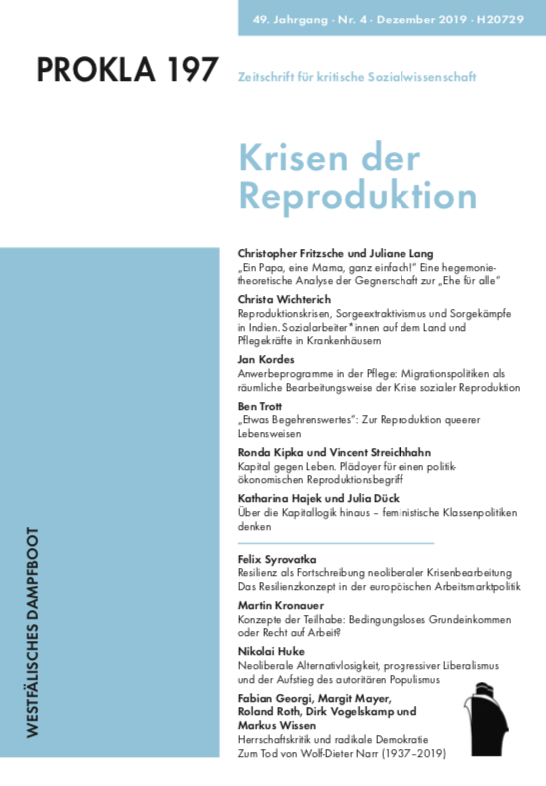Reproduktionskrisen, Sorgeextraktivismus und Sorgekämpfe in Indien
Sozialarbeiter*innen auf dem Land und Pflegekräfte in Krankenhäusern
DOI:
https://doi.org/10.32387/prokla.v49i197.1844Schlagwörter:
Indien, Reproduktionskrise, Sorgeextraktivismus, CarearbeitAbstract
In Indien protestieren seit Jahren hunderttausende Gesundheits- und Sozialarbeiterinnen gegen Geringbewertung und -bezahlung ihrer Arbeit. Wie in Europa kommt es zu einer Feminisierung von Arbeitskämpfen, weil die Ausbeutung der Sorgearbeitenden sich infolge zugespitzter Krisensituationen der sozialen Reproduktion intensiviert. Diese Sorgekämpfe haben im Alltagsverstand einer breiten Öffentlichkeit das Bewusstsein über die ökonomische und soziale Bedeutung von Sorgearbeiten verstärkt, aber die hegemoniale Geringschätzung und Niedrigstentlohnung von Sorgearbeiten nicht wesentlich verbessert. Die leitende Fragestellung dieses Beitrags ist, mit welchen Strategien und Instrumenten diese Abwertung von Sorgearbeiten unter neoliberalen Bedingungen fortgesetzt wird.
Downloads
Literaturhinweise
All India Federation of Anganwadi Workers and Helpers (AIFAWH) (2009 und 2012): Marching Ahead. Delhi/Hyderabad.
– (2016): 25 years of Struggles and Achievements 1991-2016. Delhi.
Basu, Hemantika (2018): Mode of Work Organization in Nursing: A Study on Management Practices in Private Healthcare in India, unpublished manuscript.
– (2016): Women Subordination at the Workplace: A Study of Informal Nurses in West Bengal. Paper presented at ICAS-MP Workshop ‘Making of Informal Labour Relations’, 27.09.2016, TISS. Mumbai.
Bathia, Kavita (2017): Implementation of Janani Suraksha Yojana. Mapping evidence-based policy recommendations from implementation narratives of ASHAs: 36-47. DOI: https://doi.org/10.13140/RG.2.2.14710.09284
Biju, B.L. ( 2013): India: Angels Are Turning Red – Nurses’ Strikes in Kerala. In: epw 48(52): 25–28.
Brand, Ulrich/Dietz, Kristina (2014): (Neo-)Extraktivismus als Entwicklungsoption? Zu den aktuellen Dynamiken und Widersprüchen rohstoffbasierter Entwicklung in Lateinamerika. In: Politische Vierteljahresschrift, Sonderheft 48: 128-165. DOI: https://doi.org/10.5771/9783845250298_133
Centre for Struggling Women (CSW) (2010): Nurses in India. An Assessment of Working Women’s Conditions & Experiences. New Delhi.
Damodaran, Sumangala (2013): “Women” Versus “Breadwinners”: Exploring Labour Market Dynamics, Agency and Identity Among Migrant Nurses from Kerala (India). In: Global Labour Journal, 4(3): 186-205. DOI: https://doi.org/10.15173/glj.v4i3.1140
Dasgupta, Jashodhara /Sandhya YK. (2019): Health Workforce in India: towards realising Health for all. In: mfc bulletin, feb 2019: 50-54.
Drèze, Jean (ed.) (2016): Introduction. In: Social Policy. Hyderabad: 1-21.
Gangbar, Jonathan/Rajan, Pavithra/Gayithri, K. (2014): Integrated Child Development Services in India, Working Paper 318, The Institute for Social and Economic Change. Bangalore.
Gupta, Akhil (2012): Red Tape. Bureaucracy, Structural Violence, and Poverty in India. Durham/London. DOI: https://doi.org/10.1215/9780822394709
– (2017): Changing Forms of Corruption in India. In: Modern Asian Studies 51(6): 1862-1890. DOI: https://doi.org/10.1017/S0026749X17000580
Hochschild, Arlie Russel (2003): The Managed Heart: Commercialisation of Human Feeling. Berkeley.
Jayal, Niraja Gopal (2013): Citizenship and its Discontents. An Indian History. Ranikhet. DOI: https://doi.org/10.4159/harvard.9780674067585
John, Maya (2018): Nurses in India: Migration, Precarious Employment Conditions and Resistance, unpublished paper for CWDS. New Delhi.
John, Mary (1996): Gender and Development in India, 1970s to 1990s. In: epw 31(47): 3071-77.
Makkad, Sneha Baldeo (2018): Nursing, Public Sector Hospitals and Changing Working Condition: An exploratory study of a medical College and Hospital, Punjab, Thesis, Ambedkar University Delhi, CWDS, MPhil/PhD Programme.
Nair, Sreelekha (2010): Nurses’ Strikes in Delhi: A Status Question. In: epw 45(14): 23-25.
– (2012): Moving with the times. New Delhi.
Nair, Sreelekha/Healey, Madeleine (2006): A profession on the margins. Status Issues in Indian Nursing. CWDS. New Delhi.
Nair, Sreelekha/ Timmons, Stephen/Evans, Catrin (2016). Nurses in the Private Health Sector in Kerala: Any Lessons Learnt from Their Strikes in Recent Past? In: Indian Journal of Gender Studies 23(1): 8-25. DOI: https://doi.org/10.1177/0971521515612858
NITI Aayog (National Institution for Transforming India) (2017): Appraisal Document of Twelfth Five Year Plan 2012-2017. New Delhi.
OECD (2002): USAID/India 2002. Strategic Objective Close out Report. URL: oecd.org/derec/unitedstates/36110215.pdf, Zugriff: 30.10.2019.
Palriwala, Rajni /Neetha, N. (2012a): Stratified Famialism: the care regime in India through the lense of childcare. In: Razavi, Shahra (Hg.): Seen, Heard and Counted: Rethinking care in a development context. Chicestel: 175-204. DOI: https://doi.org/10.1002/9781118297261.ch8
– (2012b): Between the State, Market and Family. Structures, Policies and Practices of Care in India. In: Razavi, Shahra/ Staab, Silke. (Hg.): Global Variations in the Political and Social Economy of Care: Worlds Apart. New York: 176-200.
Patel, Raj /Moore, Jason (2017): The History of the World in Seven Cheap Things. Oakland.
Randeria, Shalini (2009): Transnationalisierung des Rechts und der ‚listige Staat’ in Indien: zivilgesellschaftlicher Widerstand gegen die Privatisierung öffentlicher Güter. In: Randeria, Shalini/Eckert, Andreas (Hg.): Vom Imperialismus zum Empire. Frankfurt/M.: 211-236.
Ray, Panchali (2016a): Is This Even Work? Nursing Care and Stigmatised Labour. In: epw 51(47): 60-69.
– (2016b): Care (Un)Skilled: Fragmented Markets and Nursing Labour, Contemporary Kolkata, In: Fernandez, Bina u.a. (Hg.): Land, Labour and Livelihoods. Basingstoke: 239-260. DOI: https://doi.org/10.1007/978-3-319-40865-1_12
Reddy, Akhilhwari (2018): Casted out. In: Down to Earth, 16-30.6.2018.
Roychawdhury, Supriya (2018): Welfare without Work or Wages. A Contradiction? In: epw 53(35): 53-60.
Saxena, Naresh /Srivastava, Nisha (2009): ICDS in India: Policy, Design and Delivery Issues. In: IDS Bulletin 40(4): 45-52. DOI: https://doi.org/10.1111/j.1759-5436.2009.00058.x
Sreerekha, M.S. (2017): State without Honour: Women Workers in India’s Anganwadis. Delhi. DOI: https://doi.org/10.1093/acprof:oso/9780199468164.001.0001
TNAI (2001): History and Trends in Nursing in India. New Delhi.
Valiani, Salimah (2012): Rethinking Unequal Exchange. The Global Integration of Nursing Labour Markets. Toronto. DOI: https://doi.org/10.3138/9781442696563
Walton-Roberts, Margaret (2012): Contextualizing the Global Nursing Care Chain: international migration and the status of nursing in Kerala, India. In: Global Networks 12(2): 405-425. DOI: https://doi.org/10.1111/j.1471-0374.2012.00346.x
– (2015): International Migration of Health Professionals and the Marketization and Privatization of Health Education in India: From Push-pull to global political economy. In: Social Science & Medicine 124: 374-382. DOI: https://doi.org/10.1016/j.socscimed.2014.10.004
Wichterich, Christa (2019): Care Extractivism and the Reconfiguration of Social Reproduction in Post-Fordist Economies, ICDD Working Paper 25.
Workshop Report (2017): National Workshop on “Informalisation of Employment in the Health Sector”, organized by PSI, JSA, HEU Delhi, 22-23.2017. New Delhi.
Yeates, Nancy (2009): Globalizing Care Economies and Migrant Workers. Explorations in Global Care Chains. London.
Zacharia Oommen, Ginu (2015): Gulf Migration, Social Remittances and Religion. The Changing dynamics of Kerala Christians, India Centre for Migration. New Delhi.





